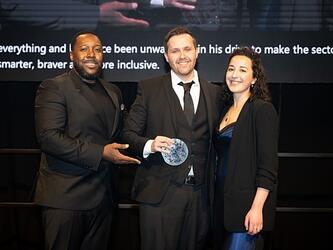Sun, mud, music, mayhem… and marketing?
The level of commercialism at UK festivals varies from event to event. So while the V Festival is a Virgin creation and so used as a platform for its brands, Glastonbury started – at least – as more of a counter-culture event and to this day sponsorship is limited.
But, this year at Glastonbury, mobile network and festival-partner EE has adopted a strategy to overcome one of the universal irritants of music festivals for the millennial generation – the inability to charge a mobile phone.
EE (which is official technology partner) is trailing the EE Festival Power Bar, a portable mobile phone charger at Glastonbury this year. Sold in advance for £20, people who purchased it can go to the EE tent on site and swap drained ones for fully recharged bars as often as they like. This is just part of EE’s on site activity. The company is also installing 4G WiFi technology, courtesy of hot-spots in the form of life-size cows (see picture), to give everyone free internet access.
This could mark an interesting shift in festival behaviour that up until now has lagged behind that seen in a wider context.
Michael Agnew, account director at global insight consultancy, Future Foundation, says there are a number of trends that could be applied to festivals but aren’t at present. “Trends such as Mobile Living, Cashless Society, Performative Leisure (sharing with networks at all times) and Locational Living (internet with locale and additional information near you) – are all ones we’re tracking, but not at festivals.
“Are we on the cusp of a change? A major barrier is that people can’t keep their mobiles charged. It’s so simple but most batteries on smartphones are dead within a day or two,” he explains.
So, the EE move at Glastonbury may result in these trends being evident in the festival environment and transform the current experience.
“Now, with 4G coverage across the site and cashless payments in official bars, it’s all shifting. So it’ll be interesting to see if there is a proliferation of smartphones compared with previous years. Festivals are definitely lagging behind the trends, if it was easier to have smartphones with you, there are so many ways they would be used: to check in, find friends and inputting personal agendas,” adds Agnew.
He cites how Spotify’s sponsorship of the US Coachella festival in California included a wristband with RFID (radio-frequency identification) embedded which acted as the ticket as well as allowing attendees to connect and share their festival experiences. By wearing the wristband people checked in at various locations, could follow their favourite acts, customise playlists and ultimately aggregate their individual Coachella journey into a digital postcard of their experience.
“A lot of data being collected is to benefit the attendee. Sponsors are collecting information but people want to feel they’re getting something in return. I’m less convinced how it would go down at Glastonbury – there’s less sponsorship and the ethos is different. I don’t know if people would want to feel they were being tracked. [Festivals are] almost a digital detox,” concludes Agnew.

We hope you enjoyed this article.
Research Live is published by MRS.
The Market Research Society (MRS) exists to promote and protect the research sector, showcasing how research delivers impact for businesses and government.
Members of MRS enjoy many benefits including tailoured policy guidance, discounts on training and conferences, and access to member-only content.
For example, there's an archive of winning case studies from over a decade of MRS Awards.
Find out more about the benefits of joining MRS here.














0 Comments